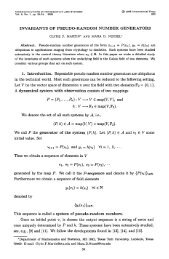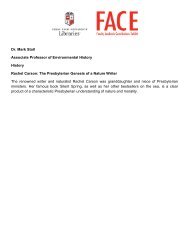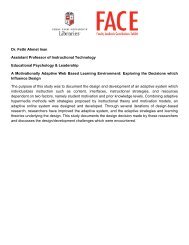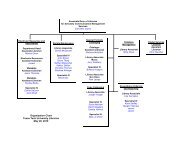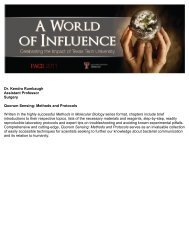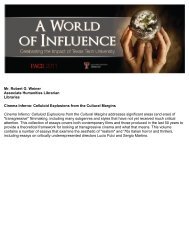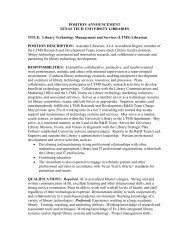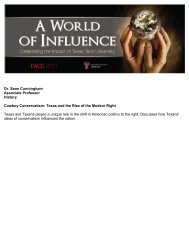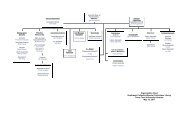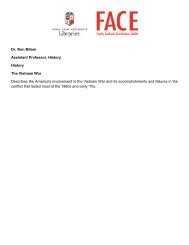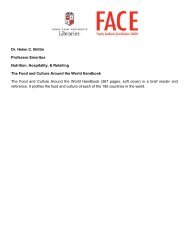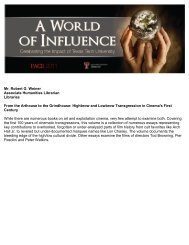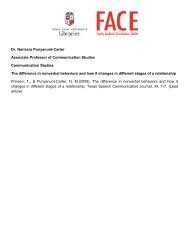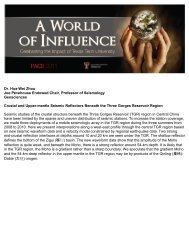Nonprofit Organizations Law and Policy Third Edition - Libraries ...
Nonprofit Organizations Law and Policy Third Edition - Libraries ...
Nonprofit Organizations Law and Policy Third Edition - Libraries ...
You also want an ePaper? Increase the reach of your titles
YUMPU automatically turns print PDFs into web optimized ePapers that Google loves.
42 OVERVIEW OF THE NONPROFIT SECTOR CH.l<br />
with "new, independent directors;" rescission or reformation of the JOCO<br />
articles of incorporation; appointment of a receiver to conduct audits of<br />
JOCO's <strong>and</strong> Phoenix's financial records; an injunction against SunTrust<br />
from releasing or distributing corporate funds; an injunction against the<br />
individual defendants prohibiting distribution of Phoenix funds; <strong>and</strong>, an<br />
order requiring Phoenix "to return all funds transferred to it or 'donated'<br />
to it by the JOCO Foundation."<br />
In the prayer, the Attorney General also asks the court to "order such<br />
terms <strong>and</strong> conditions as it deems appropriate to protect the public's<br />
interest in the charitable assets of the JOCO Foundation."<br />
* * *<br />
He [the Attorney General] also acknowledges that generally only<br />
members or shareholders of a corporation have st<strong>and</strong>ing to challenge<br />
internal management decisions of a corporation. However, he argues, this<br />
rule does not apply "where the Corporation is also a charitable foundation."<br />
The Attorney General principally relies upon Tauber u. Commonwealth,<br />
255 Va. 445, 499 S.E.2d 839 (1998), as authority for the latter<br />
proposition. He opines that "[i]nasmuch as JOCO is a charitable foundation,<br />
it is essentially a trust as well as a non-stock corporation," <strong>and</strong> that<br />
he has the common law authority to act on behalf of the public in such a<br />
case.<br />
Summarizing, the Attorney General argues that the circuit court has<br />
the authority to consider claims brought by the Commonwealth against<br />
directors of a charitable foundation, organized as a nonstock corporation,<br />
alleging the directors have breached fiduciary duties, engaged in acts of<br />
self dealing, <strong>and</strong> wasted foundation assets. The court has the power, the<br />
argument continues, to order an accounting to ensure the funds are being<br />
distributed in a way that satisfies the charitable purposes set forth in the<br />
original articles of incorporation. Also, the Attorney General contends, the<br />
circuit court "has inherent ancillary authority" to award injunctive relief<br />
<strong>and</strong> appoint a receiver.<br />
Finally, the Attorney General argues that if "Dianne Wilcox <strong>and</strong> the<br />
other individual directors of JOCO breached their fiduciary duties when<br />
they amended the original Articles of Incorporation to delete the geographic<br />
restriction on charitable donations," the circuit court "may enter<br />
an order striking the amendment <strong>and</strong> restoring the original Articles of<br />
Incorporation. "<br />
We do not agree with the Attorney General. We hold that the trial<br />
court correctly ruled that it lacked subject matter jurisdiction over the<br />
matters raised in this suit.<br />
Initially, applicable general principles should be reviewed. The phrase<br />
"subject matter jurisdiction" means the power of a court to adjudicate a<br />
specified class of cases. Subject matter jurisdiction is granted by constitution<br />
or statute, <strong>and</strong> cannot be waived. Nelson u. Warden, 262 Va. 276,281,



